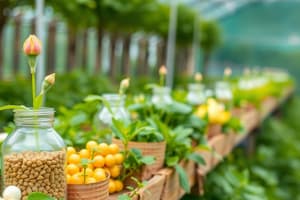Podcast
Questions and Answers
Trichoderma fungus is the basis of producing various protective biological products called _______________
Trichoderma fungus is the basis of producing various protective biological products called _______________
biofungicides
Biofungicides provide high and long-term protection of plants from a wide range of _______________ diseases
Biofungicides provide high and long-term protection of plants from a wide range of _______________ diseases
fungal
The use of biological preparations in crop production is an important step towards the _______________ of Agriculture
The use of biological preparations in crop production is an important step towards the _______________ of Agriculture
ecologization
Biological means of Plant Protection make it possible to significantly reduce or even completely stop the use of _______________ analogues
Biological means of Plant Protection make it possible to significantly reduce or even completely stop the use of _______________ analogues
Biofungicides are biological products aimed at combating fungal and _______________ diseases of grain, vegetable, fruit and berry crops
Biofungicides are biological products aimed at combating fungal and _______________ diseases of grain, vegetable, fruit and berry crops
Biological products are used to protect plants from ______, acting as soil treatments to reduce risk of diseases.
Biological products are used to protect plants from ______, acting as soil treatments to reduce risk of diseases.
Effective against early stages of diseases, but require preventative measures and frequent ______.
Effective against early stages of diseases, but require preventative measures and frequent ______.
- Divided into three main groups: bacterial, ______, and viral biological products, with the first two being more commonly used.
- Divided into three main groups: bacterial, ______, and viral biological products, with the first two being more commonly used.
Biofungicide 'Alirin B': effective against root rot, late blight, and powdery mildew, among ______.
Biofungicide 'Alirin B': effective against root rot, late blight, and powdery mildew, among ______.
Rules for working with biofungicides: proper storage, reading instructions, wearing protective gear, and safe ______.
Rules for working with biofungicides: proper storage, reading instructions, wearing protective gear, and safe ______.
Microorganisms are the active components of Biological Products, with natural fungicides designed to protect plants from bacterial and fungal ______
Microorganisms are the active components of Biological Products, with natural fungicides designed to protect plants from bacterial and fungal ______
Fungal diseases account for over 80% of all plant diseases, infecting plants through various means including stomata, wounds, and ______ pests
Fungal diseases account for over 80% of all plant diseases, infecting plants through various means including stomata, wounds, and ______ pests
Common agricultural practices like crop rotation, weed removal, and optimal feeding regimes improve overall plant health but don't eliminate ______ entirely
Common agricultural practices like crop rotation, weed removal, and optimal feeding regimes improve overall plant health but don't eliminate ______ entirely
Fungal spores and mycelial elements are well-preserved in the soil and other environments, leading to an average annual loss of 3.5% of major food crops due to fungal ______
Fungal spores and mycelial elements are well-preserved in the soil and other environments, leading to an average annual loss of 3.5% of major food crops due to fungal ______
The first fungicides were based on copper, sulfur, mercury, and chlorine, but modern fungicides include those based on fungi, bacteria, and other ______
The first fungicides were based on copper, sulfur, mercury, and chlorine, but modern fungicides include those based on fungi, bacteria, and other ______
Culture medium for bacterial cultivation: Option 1 (local liquid filtered or unfiltered Bard), Option 2 (granular ______), Option 3 (dry loose ______), Option 4 (dry granulated or crushed beer grains)
Culture medium for bacterial cultivation: Option 1 (local liquid filtered or unfiltered Bard), Option 2 (granular ______), Option 3 (dry loose ______), Option 4 (dry granulated or crushed beer grains)
Bacillus amyloliquefaciens OPS-32 strain achieves high levels of ______ in culture and does not require additional components
Bacillus amyloliquefaciens OPS-32 strain achieves high levels of ______ in culture and does not require additional components
Biological products are effective, non-accumulating, non-harmful, and can strengthen plant immunity, but have shorter ______ than chemical alternatives
Biological products are effective, non-accumulating, non-harmful, and can strengthen plant immunity, but have shorter ______ than chemical alternatives
Siderophores facilitate ______, contributing to biofungicide production and effectiveness
Siderophores facilitate ______, contributing to biofungicide production and effectiveness
Different options have varying ______ and require adjustments to ingredients and cooking processes
Different options have varying ______ and require adjustments to ingredients and cooking processes
Biological products for ______ cultivation include treatments for tubers before planting and sprays for plants during the growing season.
Biological products for ______ cultivation include treatments for tubers before planting and sprays for plants during the growing season.
Tomatoes in open ground can benefit from a variety of biological products used for seed soaking, soil watering, and plant spraying.
Tomatoes in open ground can benefit from a variety of biological products used for seed soaking, soil watering, and plant spraying.
Four biological products are registered for use on open-ground ______, including seed soaking treatments, soil watering, and plant sprays during growth.
Four biological products are registered for use on open-ground ______, including seed soaking treatments, soil watering, and plant sprays during growth.
Three biofungicides are allowed for use on white ______ on private farms to combat fungal and bacterial phytopathogenic infections.
Three biofungicides are allowed for use on white ______ on private farms to combat fungal and bacterial phytopathogenic infections.
Biological products can be used to combat gray rot on ______.
Biological products can be used to combat gray rot on ______.
Flashcards are hidden until you start studying
Study Notes
-
Biomass level of pseudomonads depends on oxygen saturation of environment for production of active bacterial drug
-
Modern bio-laboratories with aerated bioreactors necessary for bacterial cultivation and high-quality biofungicide creation
-
Various biofungicides based on bacteria manufactured by different companies: Syngenta, Corteva Agriscience, BASF, Nufarm, FMC, Agro, etc.
-
Biological enterprises also offer biofungicides on the market
-
Biofungicides of pseudomonads suppress diseases through antagonism due to complex of antibiotic substances, protein compounds, peptides, lytic enzymes, siderophores, and other biologically active compounds
-
Many rhizospheric bacteria synthesize phytohormones, stimulating plant growth and promoting mineral absorption
-
Siderophores facilitate iron transport, contributing to biofungicide production and effectiveness
-
Culture medium for bacterial cultivation: Option 1 (local liquid filtered or unfiltered Bard), Option 2 (granular bar), Option 3 (dry loose bar), Option 4 (dry granulated or crushed beer grains)
-
Different options have varying product titers and require adjustments to ingredients and cooking processes
-
Bacillus amyloliquefaciens OPS-32 strain achieves high levels of spore in culture and does not require additional components
-
Biological products are effective, non-accumulating, non-harmful, and can strengthen plant immunity, but have shorter shelf life than chemical alternatives.
-
In summer, using cloudy days for treating plants with fungicides is recommended, as heat causes water to evaporate and potentially harmful concentrations to form.
-
After fungicide treatment, remove clothes, clean nose, rinse mouth, wash thoroughly, and consider taking a shower.
-
Biological products made from live bacterial cells, fungi, beneficial microorganisms, and plant extracts are effective and safe for horticultural use, contributing to healthy plant development and fighting diseases and pests.
-
Biological fungicides are created through genetic work and function by utilizing microorganisms that are part of the pathogenic microflora.
-
Biological fungicides are effective against fungal diseases by inhibiting harmful fungi and destroying their mycelium, thereby preventing disease spread.
-
Biofungicide "Ampelomycin" is made from the fungus Ampelomyces quisqualis and is used to treat powdery mildew in plants.
-
Biofungicide "Gliocladin" is derived from the fungus gliocladium virens and effectively combats root rot.
-
Biofungicide "Coniothyrin" is produced from the fungus Conio-thyrium minitans and is effective against white and gray rot.
-
Fitosporin-M is a broad-spectrum biofungicide composed of live bacteria that suppress fungal and bacterial infections in plants and is approved for use in various crops.
-
Biological products for potato cultivation include treatments for tubers before planting and sprays for plants during the growing season.
-
Tomatoes in open ground can benefit from a variety of biological products used for seed soaking, soil watering, and plant spraying.
-
Four biological products are registered for use on open-ground cucumbers, including seed soaking treatments, soil watering, and plant sprays during growth.
-
Three biofungicides are allowed for use on white cabbage on private farms to combat fungal and bacterial phytopathogenic infections.
-
Biological products can be used to combat gray rot on strawberries.
Studying That Suits You
Use AI to generate personalized quizzes and flashcards to suit your learning preferences.




